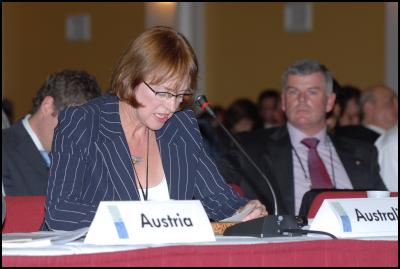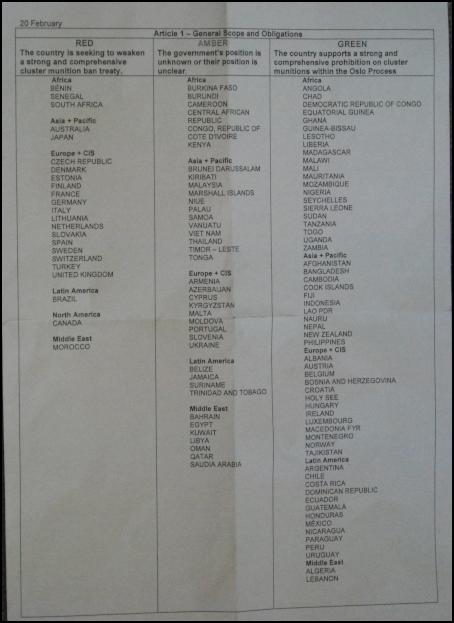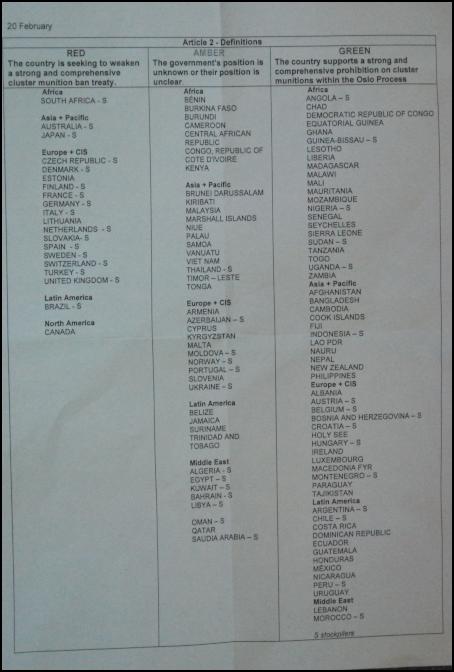Activists Sense Victory For Cluster Bomb Ban As Wellington Conference Nears End
By Alastair Thompson

Click for big version
Australian ambassador Caroline Millar speaks from the floor during the Wellington cluster munitions conference. Australia remains among a small group of mainly Western Nations seeking exceptions and a softening in the proposed Cluster Munitions Ban treaty text.(image John Rodsted)
A week long Cluster Munitions multilateral diplomatic conference is coming to a close in at the Wellington Town Hall today with what NGO activists describe as a "strong text" remaining entirely intact.
Talking to Scoop yesterday afternoon a spokesman from the Cluster Munitions Coalition (CMC) - a coalition of more than 200 NGOs who have been pushing hard for this ban - even the remaining group of nations who appear to be opposed to the ban are likely to sign on in the end to the Wellington Declaration. These nations have been offered the ability to have "compendium" of their proposals attached to the document which will then be forwarded to the final negotiation meeting in Dublin in May.
The opponents of the current wording in the text present at the conference are a group of nations which can be broadly described as allies of the United States.
They include a large number of NATO states including Canada, The United Kingdom, Spain, France, Italy and Germany as well as Australia and Japan in the Asia Pacific region and Turkey. The CMC has produced a list of Red, Amber and Green nations as a guide to the views of the nations which is reproduced below:

Click for big version
(The chart below concerns Definitions and efforts to define cluster munitions in a manner so as to exclude some cluster munitions.)
The international ban is being sought on the production, stockpiling and use of cluster munitions largely because of the terrible cost in lives and limbs - paid particularly by civilians and children - long after the weapons are used. Even high tech new weapons with so-called self-destruct mechanisms have in practice been found to leave a deadly legacy lying around killing and maiming civilians (and especially children) for years to come.
Momentum for the banning effort increased greatly after the widespread use of the weapons in Southern Lebanon at the end of the recent Israeli invasion.
Israel has been accused by some of war crimes - collective punishment & attacks on civilians - in relation to its use of old stockpiled weapons in the final three days of the war as they withdrew. It is said that Israel must have known the use of these weapons would render large parts of Southern Lebanon uninhabitable destroying the livelihoods of thousands of small farmers as well as killing and maiming hundreds of Children.
In Iraq cluster munitions were used extensively in the 2003 invasion and up to 3000 civilians are presently being killed or maimed annually by the remnants of these weapons.
The Wellington meeting is the final meeting in a round of meetings being held in advance of a final set of negotiations scheduled for May in Dublin. Already nearly 120 countries are involved in the negotiations although several key weapons using and producing states such as the United States, China, Pakistan and India are not present.
A press conference to announce the final decisions of the conference is being held today at 12pm. Scoop will provide video footage of the conference shortly after it concludes.
(continuing…)




 Binoy Kampmark: Fencing The Ocean - Australia’s Social Media Safety Bill
Binoy Kampmark: Fencing The Ocean - Australia’s Social Media Safety Bill Binoy Kampmark: Trump, AUKUS And Australia’s Dim Servitors
Binoy Kampmark: Trump, AUKUS And Australia’s Dim Servitors Peter Dunne: Dunne's Weekly - The Wrong Answer To A Question That Does Not Exist
Peter Dunne: Dunne's Weekly - The Wrong Answer To A Question That Does Not Exist Martin LeFevre - Meditations: Perception, Conception And Beauty
Martin LeFevre - Meditations: Perception, Conception And Beauty Alastair Thompson: On The Publication Of The First NCQG Text 'New Collective Quantified Goal On Climate Finance'
Alastair Thompson: On The Publication Of The First NCQG Text 'New Collective Quantified Goal On Climate Finance' Ramzy Baroud: A Nation In Denial - Why Israel’s Defeat Is Imminent
Ramzy Baroud: A Nation In Denial - Why Israel’s Defeat Is Imminent